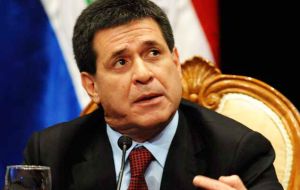MercoPress. South Atlantic News Agency
Paraguay vetoes bill imposing 10% export tax on cereals and oilseeds
 President Horacio Cartes: “highly distortive and regressive”
President Horacio Cartes: “highly distortive and regressive” Paraguayan president Horacio Cartes vetoed the bill imposing a 10% tax on export of cereals and oilseeds in their natural state recently approved by a divided Congress, arguing it was “highly distortive and regressive”. The bill now returns to the legislative.
The Executive argued that the cereals and oilseeds market in Paraguay, in particular soybeans, rests on a system where the big companies, mainly multinationals buy wheat, corn, sunflower and soy directly from the medium and small sized farmers and finally the tax-cost would have to be absorbed by the farmers.
“For this motive the levy would be a highly distortive and regressive instrument”, points out the veto decree. Even if the tax in the short term can help with significant revenue for the Treasury, in the mid and long term it will have negative results.
Likewise “it would mean the creation of a barrier to the free circulation of goods among countries which could trigger demands in the framework of the World Trade Organization, Mercosur and other international accords of which Paraguay is signatory”.
Farmers’ organizations were also strongly opposed to the initiative since they considered a ‘negative element’ for the cereals and oilseeds sector
“If the bill creating a tax on grain exports in natural state is not vetoed, it would mean a war declaration on the productive sector” had anticipated Hector Cristaldo the head of Paraguay’s agriculture farmers lobby.




Top Comments
Disclaimer & comment rules-

-

-

Read all commentsIt was to be expected that this tax would be vetoed.It was badly thought out as it affects both small farmers as well as multinationals.
Oct 17th, 2013 - 02:47 pm 0I would agree that the agricultural sector should contribute to the expansion of rural infrastructure and particularly the repair and maintenance of rural roads but it should be done on the basis of quien mas rompe , mas paga. (Those who use the roads most should pay more)
An example of this from Uruguay and the Patrimonio tax
An extensive sheep farmer perhaps uses his road for heavy transport trucks perhaps 8-10 times a year. The big forestry companies use the same road perhaps ten or twelve times a week
The forestry people pay no patrimonio tax,so who pays for their use of the roads? The sheep farmer of course
Perhaps the best wayis to tax the trucking companies.That way they will pass on thier own increased costs to the farmers and foresters who most use the roads
1) Interesting point you mention, in Argentina farmers have consortiums to fix up the dirt roads, in some places they work, some others they don’t. The truckers could of course pay something back, but the Camioneros Union of Hugo Moyano is very very powerful they will never put up with something like that easily. On the other hand if the roads had proper maintenance they would spend less on repairs on their own trucks.
Oct 17th, 2013 - 03:10 pm 0@2 I dont see why Moyano should object as the truckers would pass on the increased tax burdens to the consumers of thier services, in particular to the agricultural sector in this case
Oct 17th, 2013 - 04:38 pm 0Commenting for this story is now closed.
If you have a Facebook account, become a fan and comment on our Facebook Page!